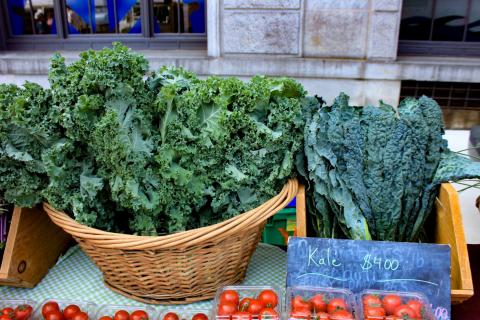
New Hampshire farmers and producers are not ones to shy away from a challenge. It takes grit to keep farms and agricultural businesses running in the Granite State, and facing COVID-19 is unlike anything the industry has had to face before.
Helping farms respond to changing circumstances is part of what UNH Extension does every day, whether it’s a changing climate, consumers or regulations. “Farmers are generally adaptable and innovative to weather, markets, diseases and many of the problems they encounter annually,” said Pooh Sprague of Edgewater Farm in Plainfield. Farmers like Sprague view COVID-19 as just another problem for the industry to adapt to, adding “people will continue to need food and gardens and our job is to be able to offer that safely.”
Olivia Saunders, fruit & vegetable production field specialist for UNH Extension in Carroll County, views giving farmers like Sprague the resources and guidance they need, when they need it, as a critical role that holds true now more than ever. “We recognize things are changing daily and information about the disease is still being developed,” said Saunders. “I feel it is our role to help growers in a disaster, even if we are not the experts. Collecting and disseminating information is our best strength.” Amy Papineau, food & agriculture program team leader for UNH Extension, added that “the challenges our farmers are facing right now are new to all of us, and it really takes a strong team to pull all the pieces together and find answers to the many new questions that are coming out of this.”
Helping farmers quickly adapt has been a collaborative effort between UNH Extension, government, industry and countless partners. Jeff Holmes, NH state executive director for the USDA’s Farm Service Agency (FSA), noted that “NH FSA and many other agricultural industry resources have partnered with UNH Extension to reach out to our state’s growers and producers to get them the very latest information to manage through our current public health crisis.” These partnerships, and the resiliency of New Hampshire’s farmers and producers, have been key to quickly adapting to this new economic environment.
Selling directly to consumers has historically been, and remains, an important part of the New Hampshire agricultural economy. “Most of the sales are done direct to consumers via farm stands, farmers’ markets, Community Supported Agriculture, Pick-Your-Own, restaurants and retail such as cooperatives and alliances,” said Nada Haddad, agricultural business management field specialist for UNH Extension in Rockingham County. As COVID-19 has impacted restaurants, farms with robust direct sales are well positioned and it’s become even more important that farms adapt to be able to sell directly to consumers while keeping their customers safe.
The situation, and the response to it, continues to change rapidly, but many New Hampshire farmers are encouraged. Demand remains strong, interest in local food seems to be growing, and agriculture and horticulture have been classified as essential businesses by the State of New Hampshire. “Farms are cranking and still in spending mode,” said Seth Wilner, agricultural business management field specialist for UNH Extension in Sullivan County. Farmers like Sean Trombly, owner of Sunny Prairie Farm in Milford, are optimistic, saying their farm “hopes customers coming into our farm stand and subscribing to our CSA for the first time will be customers for years to come.” Chris Hemmingway of Hemmingway Farm in Charlestown added “we are hopeful people will continue to buy local and support small businesses that support their communities.”
Responding to COVID-19
Right away, UNH Extension responded to the urgent needs of farmers for accessible and trusted information by developing a daily update, allowing us to share and update answers to frequently asked questions with the entire agricultural community. With new questions and information emerging every day, the daily FAQ has become a vital resource for farmers and producers to protect their employees, customers and businesses.
Shortly after, we created an open forum, accessible by video chat or phone, for members of New Hampshire’s agricultural community to connect. Twice a week since mid-March, growers and producers have been using these forums to develop new relationships and networks, solve problems, learn from experts, ask questions and identify needs.
“We launched the open forums fairly quickly once we began to understand we were in a crisis,” said Olivia Saunders. “We have had tremendous participation in the calls, both from farmers who continue to join each week, showing they see value in the call, and from agriculture service providers across many organizations. The agricultural community has come together like never before to make sure farms remain viable and continue to feed the people of New Hampshire.”
On one recent call, Eric Milligan from the NH Mushroom Company shared their plans for adapting to the steep temporary drop-off in demand from restaurants. Eric’s idea for a pop-up market sparked interest from other farmers on the call in getting involved, as well as immediate clarification from NH Department of Agriculture director Gail McWilliam Jellie on how the agency could support this and other pop-up markets to give NH farmers new markets to sell their products and safely serve customers in their communities. For Jeff Holmes from NH FSA, these forums have offered farmers like Milligan a valuable opportunity to “actively share concerns, questions and strategies for addressing the challenges that face us all”. The plan is for these forums to continue for as long as they offer value to farmers and partners.
Ray Sprague of Edgewater Farm in Plainfield, another farmer who’s adapting, shared that their business is trying a hybrid model of online, curbside and direct sales. Jonathan Ebba, landscape and greenhouse field specialist for UNH Extension in Hillsborough County, recently published a fact sheet to help growers like Sprague adapt their businesses to COVID-19 this spring by decreasing levels of contact and expanding e-commerce. Ebba emphasized that “New Hampshire’s garden centers are fortunate that Governor Sununu’s order specifically lists them as essential services.”
Extension’s new statewide farm products map is designed to help families across New Hampshire find farm products available for sale in and near their communities. Through this interactive map, farmers are able to share how customers can learn about their products, payment options, employment opportunities and food access programs including accepting SNAP/EBT payments, Granite State Market Match, discounts for veterans and other incentive programs to increase affordability. Farmers and producers will be able to update the map as they continue to adapt their offerings to customer needs. Saunders shared that UNH Extension has “also been communicating to growers how they can become SNAP-approved, and we hope the number of farms enrolled in this program will grow in the coming months.”
“We recognized the need for a quick, easily adaptable statewide map that would allow farmers to provide consumers with the timely details on what products they have and how to access them,” said Jeremy DeLisle, fruit & vegetable production field specialist for UNH Extension in Merrimack County. DeLisle shared that they are looking at ways to expand the map after the initial launch, such as connecting farms offering internships with aspiring farmers looking to learn the trade and farms needing labor to displaced workers seeking employment. “Thanks to UNH Extension’s Geospatial Technology Specialist Shane Bradt, we have been able to harness the power of this wonderful technology to put a powerful tool in the hands of both farmers and consumers,” DeLisle added.
States across the country have reached out to UNH Extension for guidance on how to replicate this effort for their states, and we’re eager to share what we’ve learned.
Program Delivery
UNH Extension isn’t just helping growers and producers adapt to COVID-19, we’re adapting too. UNH Extension has offices in all 10 New Hampshire communities, and in transitioning temporarily to remote work our team hasn’t skipped a beat.
Our staff are continuing to visit farms, without direct contact with our clients to ensure appropriate social distancing. This has meant leaning on our phones to host video chats, take and share photos and use satellite imagery and data, in the field and at home offices. We have transitioned spring workshops into free, interactive online webinars on topics including boom sprayer calibration and how to reach customers in a time of social distancing.
With restrictions on in-person meetings, UNH Extension’s pesticide safety education has taken its recertification courses online so commercial and privately-certified applicators can retain licensure to work in New Hampshire. “Applicators were finding it difficult to earn recertification credits and at the same time feeling the financial pressure of their businesses scaling back,” said Rachel Maccini, pesticide safety education program coordinator for UNH Extension. “We decided to waive the fee for all NH pesticide applicators to take these recertification courses until face-to-face instruction can be offered again,” Maccini continued.
Extension is also temporarily moving countless meetings online, including Twilight Meetings with New Hampshire fruit growers. We’re producing podcasts for commercial growers, live videos for gardeners on Facebook and sharing appropriate guidance through local media. We’re crowdsourcing photos and data from growers across the state to analyze growth stages and agricultural pest activity, and using platforms new and old including our Fruit Pest Hotline to offer timely recommendations to growers.
Despite these adaptations, our clients are still actively participating in our programs and calling on our specialists for support. While hardly seamless, these changes wouldn’t be possible if our staff didn’t already have strong relationships with farmers and producers.
For over 100 years, UNH Extension has been meeting the needs of New Hampshire agriculture to ensure it remains a thriving component of the New Hampshire economy and landscape. The times are changing and COVID-19 is a new challenge, but our commitment to serving the food and agricultural sectors of New Hampshire is as strong and unwavering as ever. Amy Papineau, Food & Agriculture Program Team Leader for UNH Extension, shared that “just as farmers continue to work as hard as ever through the changes and challenges that COVID-19 brings, Extension continues to provide support, education, and answers to help farmers meet these new challenges. It is an honor to be able to support the resiliency of NH farmers as all adapt and grow.”
Explore all we have to offer New Hampshire farms and agricultural businesses in response to COVID-19 on our dedicated Agricultural Resources for COVID-19 page.

